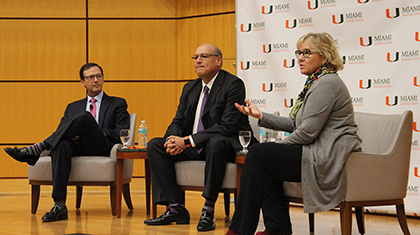Mauricio Ortiz, president of Latin America, and fellow executives Maria Johnson and Juan Felipe Ramirez—both with extensive experience managing crises in the region—comprised the crisis management team that allowed for BS to get 100 percent of its employees back to work and its Dorado plant up and running within three days after the storm. They shared their insights and experiences in their talk “Crisis Management: Puerto Rico” to business leaders, students and faculty at the Storer Auditorium.
“The most important thing that we did was to empower everyone within the organization to generate solutions. We knew that the leadership team alone didn’t have the answers—everybody has to show leadership,” said Ortiz, adding that the team also relied heavily on the “emotional intelligence” or its employees at all levels.
BSC, a worldwide developer and manufacturer, employs 1,100 employees in Puerto Rico where its plant produces pacemakers, defibrillators, and other medical devices critical to hospitals and patients around the world.
Hurricane Maria, the worst disaster ever to hit the Caribbean island, plowed through the island on September 20, 2017. With Puerto Rico’s infrastructure destroyed, the BSC team—aided by corporate support—arranged for a plane from South Florida to fly in essential supplies—60 power generators, along with the extension cords and fuel to run them; satellite phones that could function on the island whose entire cell system was downed; cash advances to employees; and then managed to purchase portable water from hotels who had no electricity and couldn’t operate themselves. The goods were essential to help BSC employees get back on their feet and back to work.
“You don’t know what you don’t know,” said Johnson, adding that “we said this to each other over and over” as the team tried to manage the wide range of shifting obstacles.
The Dorado plant made its first product shipment—delivered by the firm’s contracted jet—one week after the storm hit. By October, production resumed to 43 percent and 85 percent by November, according to the team.
To a question posed by Business School Dean John Quelch about the “risky” tendency to concentrate production at one site, Ortiz said that BSC Puerto Rico has since shifted a portion of its production to facilities elsewhere as part of its “lessons learned.”

